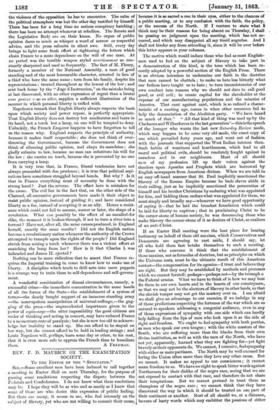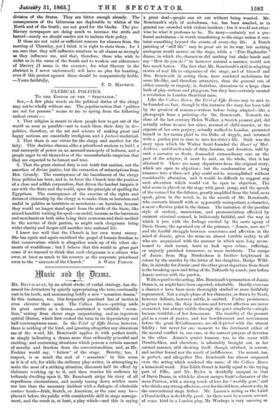REP. F. D. MAURICE ON THE EMANCIPATION SOCIETY.
To THE EDITOR OF THE " SPECTATOR."
Sin,—Some excellent men have been induced to call together a meeting in Exeter Hall on next Thursday, for the purpose of passing some resolutions respecting the dispute between the Federals and Confederates. I do not know what these resolutions may be. I hope they will be as wise and as manly as I know that some of those are who desire this expression of public feeling. But there are many, it seems to me, who feel intensely on the subject of Slavery, yet who are Hot willing to commit their cause, because it is so sacred a one in their eyes, either to the chances of a public meeting, or to any confusion with the faith, the policy, or the success of the North. If I venture to state what 16 think may be their reasons for being absent on Thursday, I shall be passing no judgment upon the meeting, which has not oc- curred, and which may disappoint all my timid auguries. And I shall not hinder any from attending it, since it will be over before this letter appears in your columns.
The motive which would induce those who feel as most English- men used to feel on the subject of Slavery to take part in a demonstration of this kind, is the tone which has been re cently adopted by a powerful section of the English Press. There- is an obvious intention to undermine our faith in the doctrine that men cannot be chattels ; to make us hate less bitterly what our fathers have taught us to hate ; to turn inconsistencies of our own conduct into reasons why we should not dare to call good good, or evil evil ; to create capital for the slaveholder at the expense of our manufacturing populations and the miseries of America. That cant against cant, which is so refined a charac- teristic of a canting age, comes in when other resources fail to help the denunciation of the Abolition party. " We have heard so much of that." " All that kind of thing was used up by the Clarksons and Wilberforces in the last generation"—this is the speech of the lounger who wants the last new Saturday Review mode, which may happen to be some very old mode, the exact copy of one which prevailed forty years ago, and went out of fashion. with the journals that supported the West Indian interest then. Such habits of weariness and heartlessness, which lead to all moral and political evils, should be resolutely fought against in ourselves and in our neighbours. Most of all should men of my profession lift up their voices against the slanders upon Apostles and Prophets which are borrowed by English newspapers from American divines. When we are told in an easy off-hand manner that St. Paul implicitly sanctioned the Slavery of the Roman Empire because he bade slaves abide in their calling, just as he implicitly sanctioned the persecution of himself and his brother Christians by enduring what was appointed for lain, and bidding them endure what was appointed for them, we must simply and broadly say—whenever we have good opportunity of saying it—that he laid the broadest foundation which could be laid for liberty to captives ; that in proclaiming Christ to be the corner-stone of human society, he was denouncing those who make Slavery the corner-stone of it as deniers of Christ, as exalters of an anti-Christ.
If an Exeter Hall meeting were the best place for bearing testimony on behalf of these old maxims, which Conservatives and Democrats are agreeing to cast aside, I should say, let all who hold them fast betake themselves to such a meeting. If those who convene it think that the establishment of these maxims, not as formulas of doctrine, but as principles on which the Universe rests, must be the ultimate result of this American contest—the compensation for its agonies—I trust and believe they are right. But they may be established by methods and processes which we cannot foretell; perhaps—perhaps not—by the triumph o the Federal armies. What we have to think of is how we may best fix them in our own hearts and in the hearts of our countrymen, so that we may not be the abettors of Slavery in other lands, so that the slavish temper may not get the mastery over us. I am afraid we shall give an advantage to our enemies, if we indulge in any of those predictions respecting the fortunes of the war which are so natural to speakers addressing a congenial audience, even in any of those expressions of sympathy with one side which can hardly help falling from the lips of men who look upon it as the side of right and freedom. We ought to feel sympathy with both parties, as men who speak our own tongue ; with the white masters of the South, who are suffering more than the blacks from their own divine institution, as well as with the men of the North, who have not yet, apparently, learned what they are fighting for—yet fight bravely as their opponents do. We cannot, I conceive, feel sympathy with either as mere partisans. The North may be well excused for loving the Union often more than they love any other cause. But we cannot. It makes no appeal to our consciences ; it cannot mean freedom to us. We have no right to speak bitter words against Northerners for their dislike of the negro race, seeing that we are not exposed to contact with that race, and therefore do not share their temptations. But we cannot pretend to treat them as champions of the negro race ; we cannot think that they have discovered the way in which it should be treated on one part of their continent or another. Most of all should we, at a distance, beware of hasty words which may embitter the passions of either division of the States. They are bitter enough already. The consequences of the bitterness are deplorable to whites of the North and of the South; are not good for the blacks. The' pro- Slavery newspapers are doing much to increase the strife and hatred—surely we should resolve not to imitate their policy.
If these are not valid or sufficient reasons for absence from the meeting of Thursday, yet I think it is right to state them ; for I am sure that they will influence numbers in all classes as strongly as they influence me, and that, therefore, those who wish to enlist us in the cause of the South and to weaken our abhorrence of Slavery (I mean in the concrete, for what Slavery in the abstract is I never understood) will have no plea for boasting, even if this protest against them should be comparatively feeble. —Yours faithfully,
F. D. MAURICE.































 Previous page
Previous page